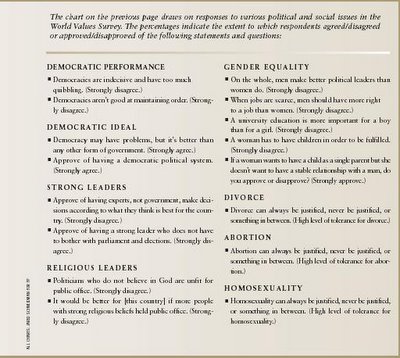At a more basic level, however, Western concepts differ fundamentally from those prevalent in other civilizations. Western ideas of individualism, liberalism, constitutionalism, human rights, equality, liberty, the rule of law, democracy, free markets, the separation of church and state, often have little resonance in Islamic, Confucian, Japanese, Hindu, Buddhist or Orthodox cultures. Western efforts to propagate each ideas produce instead a reaction against "human rights imperialism" and a reaffirmation of indigenous values, as can be seen in the support for religious fundamentalism by the younger generation in non-Western cultures.
Foi o que fizerem Ronald Inglehart e Pippa Norris, aqui. Os dados utilizados são do World Values Survey entre 1995 e 2001, resultantes de inquéritos aplicados não só na maior parte dos países ocidentais mas também no Irão, Egipto, Argélia, Turquia, Indonésia, Marrocos, Jordânia, Azerbeijão, Turquia e Bangladesh, entre outros. As questões colocadas foram as seguintes:

Os resultados obtidos foram estes:

Conclusões:
1. With the exception of Pakistan, most of the Muslim countries surveyed think highly of democracy: In Albania, Egypt, Bangladesh, Azerbaijan, Indonesia, Morocco, and Turkey, 92 to 99 percent of the public endorsed democratic institutions—a higher proportion than in the United States (89 percent);
2. A solid majority of people living in Western and Muslim countries gives democracy high marks as the most efficient form of government, with 68 percent disagreeing with assertions that “democracies are indecisive” and “democracies aren’t good at maintaining order.” (...) And an equal number of respondents on both sides of the civilizational divide (61 percent) firmly reject authoritarian governance, expressing disapproval of “strong leaders” who do not “bother with parliament and elections.”
3. Muslim societies display greater support for religious authorities playing an active societal role than do Western societies. (...) Citizens in some Muslim societies agree overwhelmingly with the statement that “politicians who do not believe in God are unfit for public office” (88 percent in Egypt, 83 percent in Iran, and 71 percent in Bangladesh), but this statement also garners strong support in the Philippines (71 percent), Uganda (60 percent), and Venezuela (52 percent). Even in the United States, about two fifths of the public believes that atheists are unfit for public office.
4. When it comes to attitudes toward gender equality and sexual liberalization, the cultural gap between Islam and the West widens into a chasm. On the matter of equal rights and opportunities for women—measured by such questions as whether men make better political leaders than women or whether university education is more important for boys than for girls—Western and Muslim countries score 82 percent and 55 percent, respectively. Muslim societies are also distinctively less permissive toward homosexuality, abortion, and divorce.
5. “The peoples of the Islamic nations want and deserve the same freedoms and opportunities as people in every nation,” President Bush declared in a commencement speech at West Point last summer. He’s right. Any claim of a “clash of civilizations” based on fundamentally different political goals held by Western and Muslim societies represents an oversimplification of the evidence. Support for the goal of democracy is surprisingly widespread among Muslim publics, even among those living in authoritarian societies. (...) But economic development generates changed attitudes in virtually any society. (...) Thus, relatively industrialized Muslim societies such as Turkey share the same views on gender equality and sexual liberalization as other new democracies.
(...)
The United States cannot expect to foster democracy in the Muslim world simply by getting countries to adopt the trappings of democratic governance, such as holding elections and having a parliament. Nor is it realistic to expect that nascent democracies in the Middle East will inspire a wave of reforms reminiscent of the velvet revolutions that swept Eastern Europe in the final days of the Cold War. A real commitment to democratic reform will be measured by the willingness to commit the resources necessary to foster human development in the Muslim world. Culture has a lasting impact on how societies evolve. But culture does not have to be destiny.
Sem comentários:
Enviar um comentário